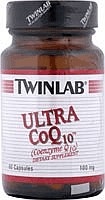|
Coenzyme Q10 and MigraineCOQ10 has been recommended more and more in the past few years as a treatment for migraine. We're going to take a closer look at Coenzyme Q10 and migraine treatment - is it safe? Does it work? What is Coenzyme Q10?Coenzyme Q10 is a chemical compound found naturally in the human body (and in other animals as well). It's involved in generating energy in cells, and so is found in abundance particularly in the mitochondria (sometimes called the "power plant" of the cell).Levels of CoQ10 can change in the body. Levels can decrease with age, and can also be low in patients with certain chronic conditions, including heart conditions, diabetes, and HIV/AIDS. Some medications also tend to lower CoQ10 levels, such as statins (used to lower choloseterol - ie Lipitor (atorvastatin) and Pravachol (pravastatin)), beta-blockers such as Inderal (propranolol), and tricyclic antidepressants such as Elavil (amitriptyline). Uses of Coenzyme Q10We'll talk about the Coenzyme Q10 and migraine connection in a moment. But what other uses does it have?First, we know that taking a CoQ10 supplement can raise CoQ10 levels in people who are "deficient". It could be that some kind of deficiency explains why it's useful in treating other conditions. Hypertension (high blood pressure): CoQ10 is probably used most often to treat high blood pressure. Though certainly not a cure-all, it does seem to lower blood pressure somewhat. Research on CoQ10 is still in the early stages. There are a host of other treatments that show some promise, but well designed studies are few. CoQ10 treatment has been suggested, for example, to people with asthma, chronic fatigue syndrome, mitochondrial diseases, and Parkinson's disease. Coenzyme Q10 and MigraineWhat about CoQ10 and migraine? There is increasingly positive evidence that CoQ10 may benefit migraineurs. Although it may not be as powerful as some other treatments, many doctors and patients like coenzyme Q10 because it doesn't cause a lot of side effects.Though most researchers are still wanting better trials, there has been some positive research recently. A study in 2005 found that CoQ10 treatment for migraine reduced attack-frequency, headache days and days with nausea by the third month of treatment. (See Efficacy of coenzyme Q10 in migraine prophylaxis: a randomized controlled trial. Recently there has been increased interest in coenzyme Q10 and migraine in children and youth. A study in 2007 suggested that young patients be tested for CoQ10 deficiency, then treated accordingly. They found that, not only did levels improve, the patients also had fewer headaches and lower disability. A study in 2010 tried comparing coQ10 with amitriptyline (a tricyclic antidepressant - Elavil, Sarotex, etc) in young patients being treated for cyclic vomiting syndrome (which commonly comes from migraine, particularly in children). The study found that there was significant improvement in both sets of patients. However, while none of the patients had side effects from the CoQ10, 21% of the patients on amitriptyline had side effects so serious they had to stop taking the medication. These results back up previous trials of coenzyme Q10 and migraine that were also positive. Why does it work?As with most migraine treatments, it's unlcear why CoQ10 helps some people. However, there are some interesting connections with migraine and some of the other diseases that CoQ10 is used to treat. For example, migraineurs are also at greater risk of heart diseases.Also, coQ10's role in the mitochondria may suggest a link between migraine and mitochondrial diseases. It's also interesting that some of the medications that may decrease levels of coenzyme Q10 are taken by migraineurs - such as tricyclic antidepressants and beta-blockers. Perhaps coq10 supplements restore a natural balance to the body and allow other treatments to work better. Interestingly, riboflavin (vitamin B2) has a similar function in the body to coQ10, and it has also been successfully used in migraine prevention. Who should not take CoQ10?As with any supplement, you should talk to a doctor first who knows your medical history. However, here are some specific things to watch for:
Taking Coenzyme Q10 for Migraine
Doses for children and adolescents have not been established, but one of the studies we mentioned above use 1-3mg of coQ10 per kg (about 2.2lbs). Liquid gel caps are recommended. Some recommended brands include Twinlab Ultra CoQ10 Be sure to take the supplements for 3-4 months, keeping a migraine diary. They may not fully reach their potential until the 3rd or 4th month. There are also certain foods that contain high levels of coenzyme Q10. Some of the best include grapeseed oil, parsley, olive oil, mackerel (red flesh) and beef (especially the heart). However, these are of course small amounts, which is why the supplement is helpful. References: Possible Interactions with: Coenzyme Q10, Ernest B. Hawkins, MS, BSPharm, RPh and Steven D. Ehrlich, N.M.D. (Reviewed 2007); Coenzyme Q10, Medline Plus (2009); Efficacy of coenzyme Q10 in migraine prophylaxis: a randomized controlled trial. Neurology Department, University Hospital Zurich, Switzerland (2005); Treatment of cyclic vomiting syndrome with co-enzyme Q10 and amitriptyline, a retrospective study., Childrens Hospital Los Angeles (2010); Coenzyme Q10 deficiency and response to supplementation in pediatric and adolescent migraine., Cincinnati Children's Hospital Medical Center (2007); Coenzyme Q10 May Ward Off Migraine Attacks, Melissa Schorr, Medscape News (2004); Migraine and Other Headaches, Drs William B. Young and Stephen D. Silberstein (2004); Coenzyme Q10, Mayo Clinic (2010); The Keeler Migraine Method, Dr Robert Cowen (2008); Clinical aspects of coenzyme Q10: an update., Polytechnic University of Marche (2005) |
